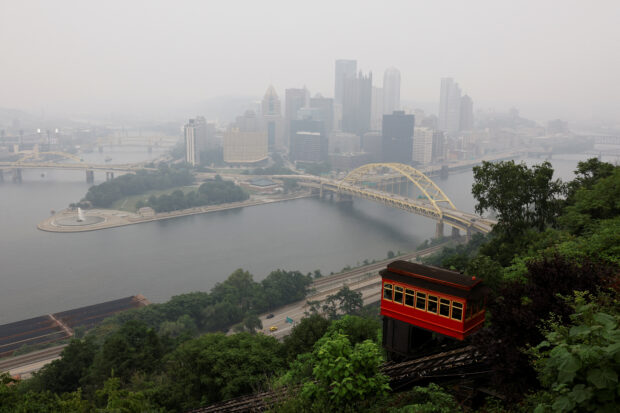
Pittsburgh’s Duquesne Incline ascends Mount Washington as smoke, from Canadian wildfires, hanging over the U.S. Midwest and parts of the East Coast create hazy skies, in Pittsburgh, Pennsylvania, U.S. June 28, 2023. REUTERS/Quinn Glabicki
CHICAGO — Murky, dull skies loomed over tens of millions of Americans on Thursday as smoke from prolonged Canadian wildfires drifted across the Midwest and East, causing unhealthy and, in some spots, dangerous conditions.
Air-quality alerts were in effect until midnight for a swath of the United States that extended from Wisconsin and northern Illinois stretching through Michigan and Ohio and extending into New York, Washington and the East Coast, the National Weather Service said.
More than 100 million Americans were urged to limit prolonged outdoor activities, and, if needed, wear a mask if they suffer from pulmonary or respiratory diseases. Children and the elderly were also advised to minimize or avoid strenuous activities.
People living in major U.S. cities such as New York City, Chicago and Philadelphia saw smoky skies that dulled the summer sun as the smell of burning wood lingered in the air.
“Air quality is unhealthy in every corner of the state,” New York Governor Kathy Hochul said during a morning press conference, recommending that residents regularly check the air quality in their area. “This is the new normal for New Yorkers.”
On Thursday morning, smoke hung over Chicago for the third day in a row. The air quality was “Unhealthy” in the third-largest city in the United States, which was joined by Detroit and Washington D.C. as having the poorest air among major cities on the planet, according to IQAir.com, which tracks pollution.
“The air quality in Chicago has been dreadful, giving me brutal migraines. Feeling better today with my trusty air purifier on full blast. Taking a chill day,” said a Twitter user named Skaar.
The air-quality alerts were triggered by drifting smoke from wildfires burning in Canada, which is wrestling with its worst-ever start to wildfire season.
An area of 8 million hectares (19.8 million acres), bigger than West Virginia, has already burned. On Wednesday, there were 477 active blazes, about half which were considered out of control, spread from the Pacific to the Atlantic coasts.
While poor air quality was the concern in the Midwest and East, the U.S. South was again dealing with a brutal heat wave that promised to persist throughout the day on Thursday and into the long Fourth of July holiday weekend.
The heat index – which measures how hot it feels due to the combination of humidity and temperature – was expected to climb to 100 degrees Fahrenheit (38 Celsius) and in some spots as high as 115 degrees F (46 C). The weather service urged people to seek air-conditioned spaces and drink plenty of water.